Student recommendations
“I am grateful to the students who have used their voices to inform three years of vital work to confront anti-Black racism at TMU. With their input, we have gained an even clearer understanding of the challenges Black students face at this institution and what we should pursue to address them. This progress represents our ongoing and collective commitment to centre their honest feedback and thoughtful ideas to support Black flourishing with high-impact supports, safer spaces and expanded funding for student-led initiatives.”
- Jen McMillen, Vice-Provost, Students; co-chair of the Student Working Group
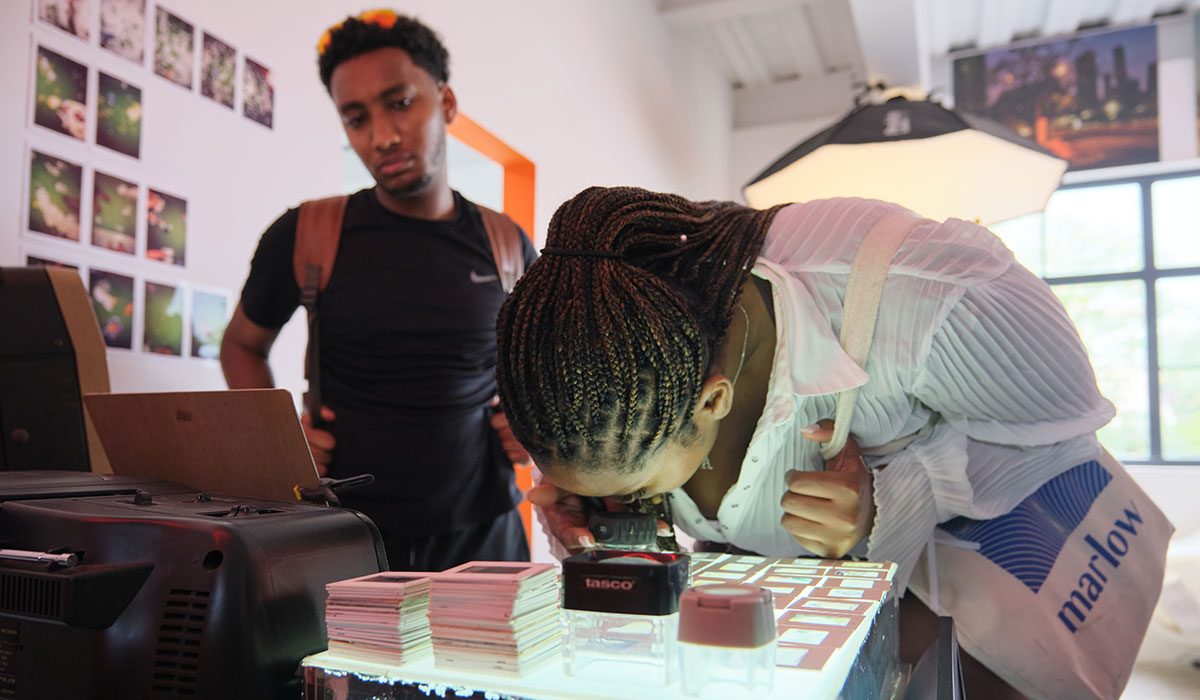
Students in the Global Justice and Change Program examining photo strips (2023).
The Climate Review revealed persistent and consistent experiences of anti-Black racism at TMU with Black students offering a broad range of reflections on the inequities that have contributed to upholding barriers, limiting opportunities or impacting Black students’ overall sense of security and belonging on campus, inside and outside of the classroom.

A concerted and deliberate effort to diversify disciplines and programs should be undertaken. This would include curriculum, internships, placements and other program practices that impact student success.

Student, Divine Amayo, in the TMU library (Kenya-Jade Pinto, 2023).
What has changed?
Relevant goals were developed to meaningfully diversify disciplines and programs that impact Black student success across each area identified in the recommendation.
Diversifying curriculum
The Student Working Group is committed to building on the foundation of existing curricula to propose a new interdisciplinary undergraduate degree program inclusive of Caribbean, Black and other relevant disciplines. To inform curriculum development and hiring practices, the PICCABR has completed an internal course audit and environmental scan of Black studies programs to benchmark existing diversity in curriculum and course delivery and inform curriculum development and hiring practices. The audit, completed in 2022, identified Black teaching staff across faculties and programs and found 116 courses across the university with Black-, African- and Carribean-centred content. The group has set a goal to achieve 100 per cent of undergraduate and graduate programs at the university, offering a suite of courses that centre the experiences of Black students, promote Black scholarship and apply principles of anti-Black racism in curriculum, teaching and learning.
Diversifying internships and placements
Intent on ensuring that experiential learning opportunities reflect the diversity of TMU’s student body and the City of Toronto, the Student Working Group has been taking steps to diversify placement sites and internships and work with more Black-owned and operated partners. These opportunities ensure extra-curricular learning for students that complements and intersects with their learning inside the classroom.
What is next?
The multifaceted nature of these goals and the considerations accompanying university academic procedures and policies will continue to be explored and actioned.

Student recommendation #2
Campus-wide training in EDI across all disciplines and programs that is sustained and reinforced by leadership.
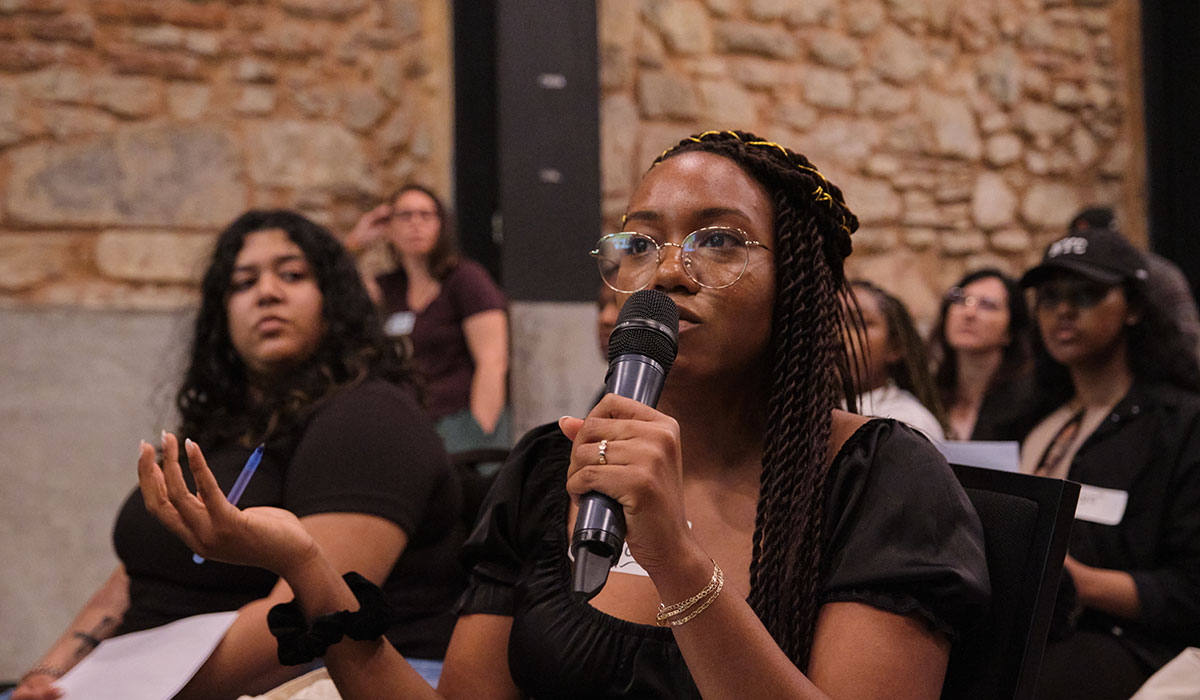
Student, Adriana Hyde, as part of an event for the Global Justice and Change Program (2023).
What has changed?
Following the recommendation for campus-wide training, over 16 customized training sessions and workshops have been developed and delivered to nearly 2,000 stakeholders across the university by the Anti-Black Racism Education and Awareness Facilitator, OVPECI. These include training focusing on anti-Black racism in areas such as unconscious bias, microaggressions, EDI principles, intersectionality, inclusive teaching, learning and hiring. The sessions engaged students, faculty, staff, leaders and alumni in theoretical and practical learning modules across departments such as TMU’s Medical Centre, the Chang School of Continuing Education, the Faculty of Engineering and Architectural Science, Athletics and Recreation and Human Resources.
Additionally, Human Resources led extensive research into EDI competency development for staff, students and faculty to inform the creation of a campus-wide EDI Knowledge and Action Framework. Review the section on staff recommendation number two for more information on this initiative.
What is next?
In addition, training sessions covering a range of topics that serve to confront anti-Black racism and foster the conditions for Black flourishing and belonging at TMU will be sustained through education and awareness activities delivered directly by the OVPECI and through diffusion in the training they provide to trainers so that these principles can be embedded into their work.

Student recommendation #3
Black faculty representation needs to be addressed in programs, departments, schools and faculties.
Please note this recommendation was transferred to the faculty recommendations section.

Student recommendation #4
Campus safety and security needs to be prioritized to positively impact Black student belonging, with security to be trained in EDI.
What has changed?
To prioritize Black student belonging and safety on campus, the PICCABR has engaged Community Safety and Security in developing and implementing strategies ranging from more transparent complaints processes and EDI training to Black community engagement and increasing public awareness.
The Strategic Outreach and Response Team (SORT) was piloted within Community Safety and Security to encourage non-uniformed responses to incidents that centre support, rapport building and community engagement when appropriate. Since its launch in spring 2022, there have been approximately 4,500 interactions in which a team of SORT community engagement and outreach staff were deployed instead of a high-profile security response.
This initiative is accompanied by proactive efforts co-led by the OVPS and the Executive Director, Community Safety and Security, to host events that provide opportunities for Black students to engage with community security departments in social settings as well as efforts to connect with departments such as Human Resources, Housing and Residence Life, Student Wellbeing, Student Care and Athletics to review interactions and how students can be better informed of security's involvement in the enforcement of relevant policies and procedures.
The BSAC was consulted on these efforts, resulting in a social mixer that invited Black students to get to know the Community Safety and Security team.
Beyond investment in proactive community-building, efforts have been underway to review and update Community Safety and Security processes from a confronting anti-Black racism lens. The OVPECI has supported the team in embedding anti-Black racism awareness into the onboarding process for new safety and security staff on campus. Additionally, a consultation was held to inform a revised and front-facing complaints process that emphasizes transparency and accessibility.
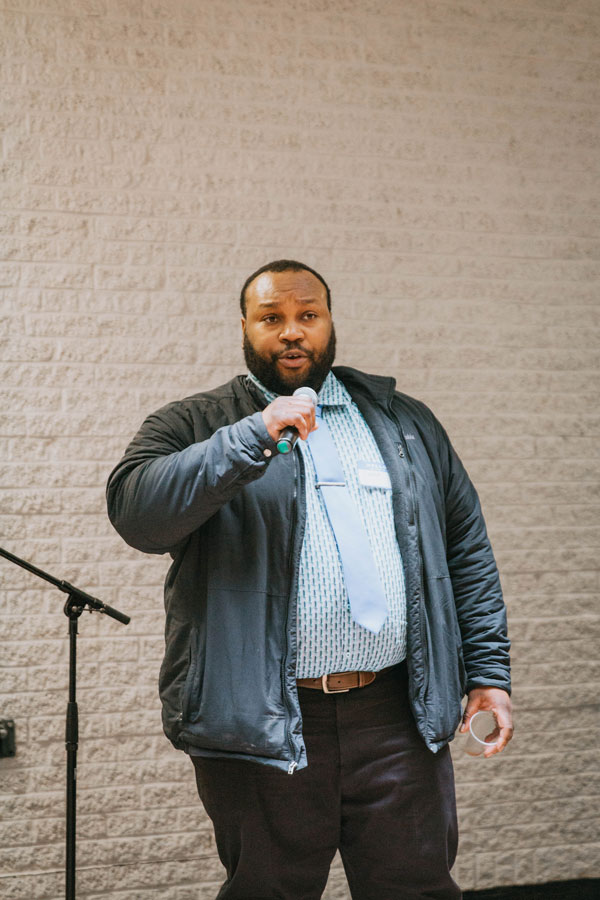
Lance Campbell, Security Operations Manager, delivering an address at the Black Excellence Mixer (2020).
What is next?
Community Safety and Security will continue to pilot the SORT initiative, finalize the revised complaints process and collaborate with the OVPECI to develop e-learning and awareness sessions covering anti-Black racism, unconscious bias and building cultural competency.
Additionally, the team is revising its website to foster a better sense of community and understanding through education and awareness of Community Safety and Security initiatives to promote community engagement and a sense of belonging on campus. The team will continue to focus on increasing the number of proactive community-building opportunities with Black students through social events.
“As the leaders of safety and security on campus, we must ensure that all of our community members, especially Black students, faculty, staff and members from other equity-deserving groups, feel safe while trying to work, learn and grow on campus. How we achieve this is by better understanding the needs of our community, by being allies and undergoing any changes necessary to be the best support we can be for the community we serve.”
- Lance Campbell, Manager, Security Operation, Community Safety and Security

Student recommendation #5
Funding of events, meetings and information sessions that specifically support and centre Black students should be created and/or enhanced.
What has changed?
The OVPS, in partnership with the OVPECI, has made significant progress on implementing the recommendation to strengthen events, meetings and information sessions that specifically support and centre Black students.
A core element of implementing this recommendation is to amplify Black student voices and experiences on campus and apply community-driven approaches to promote Black flourishing. This commitment was first demonstrated through engagement with the BSAC and solidified through initiatives like the Let’s Talk: Amplify Black Voices program, which aimed to strengthen linkages between students and OVPS and invite more Black students to intentionally shape the university’s work in confronting anti-Black racism.
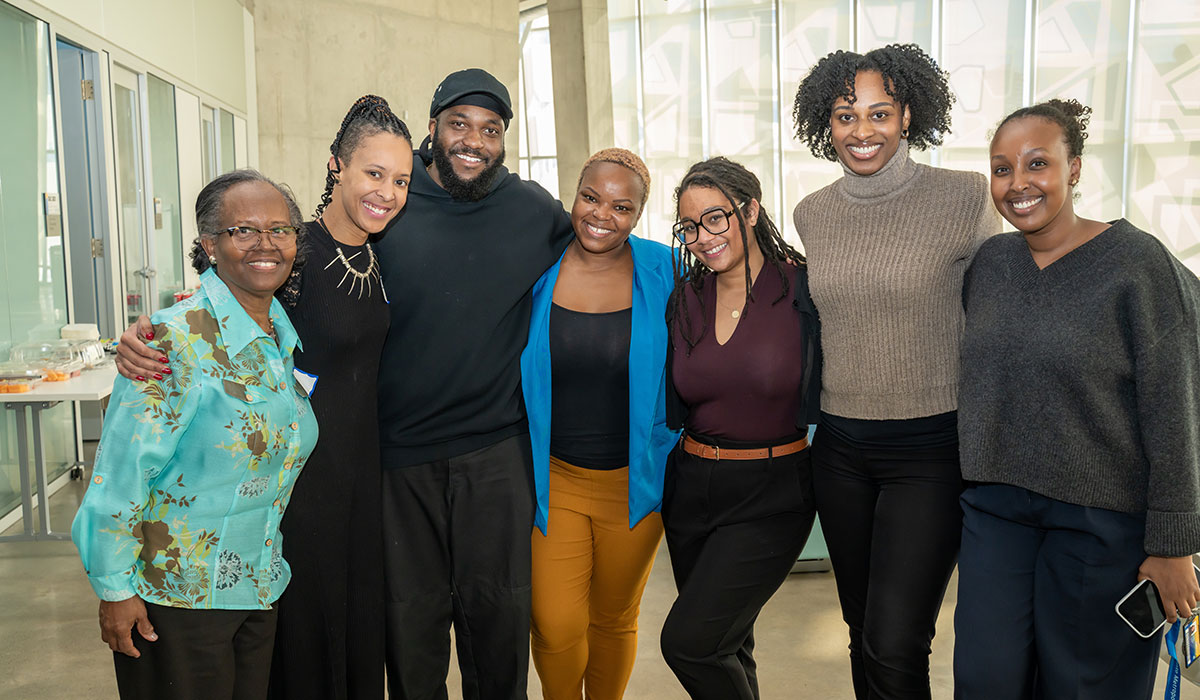
Black Excellence Committee at the Black Excellence Mixer (2024).
The Black Initiatives Fund, an extension of the Student Initiatives Fund, was also established to equip Black students with resources and support to lead their initiatives. During the 2022-2023 academic year, the fund released nearly $25,000 for Black student-led initiatives focusing on projects that amplified Black mental health, queerness, accessibility, gender identity and Black expression.
Next, a new position was created and filled by OVPS to directly respond to recommendations in the Climate Review and elevate previous work being done to support Black student success in the Tri-Mentoring Program. The Black Student Support Facilitator has continued to develop opportunities, resources and networks to promote student success and elevate Black students at the university. Since the role was launched in 2021, the Black Student Support Facilitator has cultivated an online community of nearly 600 Black students while offering intentional opportunities for academic, personal, career and social development activities for Black students.
In 2021, TMU’s Career, Co-op and Student Success Centre and the Tri-Mentoring Program launched the Race Forward Program. This annual initiative supports Black students' career decisions with professional development training, networking opportunities and mentorship. Monthly learning sessions were also convened throughout 2022-2023 to promote Black excellence through academic, social and emotional support and group mentorship. These thoughtfully designed events invited Black students to co-create understanding through open dialogue, network with Black faculty and staff, build confidence and psychological safety and strengthen social connectedness and support systems.
Tailored events also provided students with tools to support wellness and financial management and opportunities to engage in culturally relevant and gender-responsive discussions around topics such as Black hair. Over 100 students have attended the Let’s Talk Hair programs, many of whom report leaving with a strong sense of community and gratitude for a space to share their natural hair experiences.
“What we don’t get to talk about in our curriculum is self-care - and it’s a direct contributor to our mental well-being. As Black people, our hair is so important to us, so to have a seminar like this—to educate us, to get us engaged—it motivates us. It shows us that other people care. It drives us to take care of ourselves.”
- Black student who attended the Let’s Talk Hair session
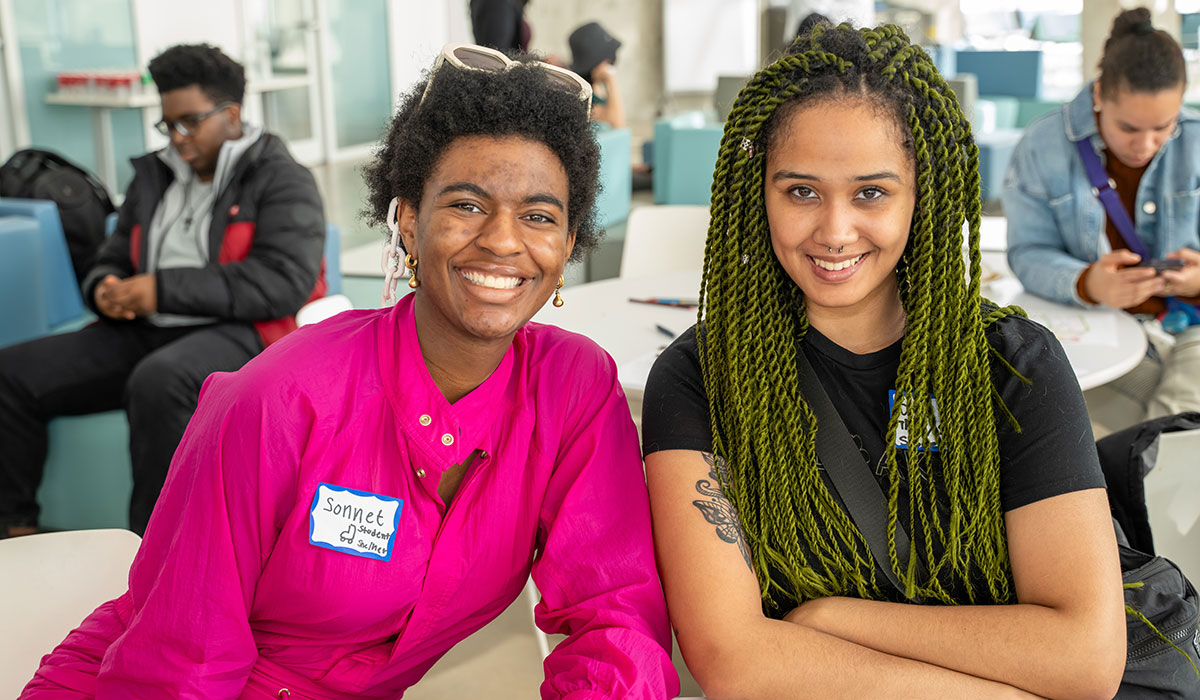
Students, Sonnet Hines and Sara Eyre, at the Black Excellence Mixer (2024).
Other tailored events were regularly held, such as Connect2Flourish, which offered group mentorship sessions inviting Black students and faculty to access resources and learn from one another.
Several large-scale annual events, such as the Black Excellence Graduation Celebration, mobilized the broader university in commemoration of the accomplishments of Black students. The celebration and the annual Black Excellence Mixer were organized by the Black Excellence Committee, a collaboration between OVPECI, the Tri-Mentoring Program led by the OVPS, the Talent Management Centre of Expertise in Human Resources and Magnet.
What is next?
OVPS will engage with OVPECI and the President’s Office to establish an efficient and ongoing governance model for engagement with the incoming BSAC.
Additionally, Student Affairs will continue to offer Black student support opportunities such as group mentoring for Black students, drop-in lunches, and programs like Let’s Talk Space in the Black Student Lounge throughout the year and participate in planning annual, Black-centred events.

Student recommendation #6
A dedicated Black student space on campus with the necessary resources allocated to it for Black students to feel safe and a sense of belonging is needed. These resources should involve funds for staffing and programming for Black students.
The Black Student Lounge (BSL) was designed as a dedicated space on campus where Black students across diversities and experiences can study, rest, meet friends, build community, attend events and experience joy. The BSL aims to provide a purposeful and identity-affirming space where Black students at TMU can recharge, foster connection and feel a sense of belonging.
The BSL was first created in 2019 by the OVPECI and relaunched in 2022 by the PICCABR’s Student Working Group.
“The BSL is like a home to me. It’s a space where the dynamics have characteristics of my Nigerian culture, and I enjoy engaging and interacting with the people. We speak a universal language only Black/African people could know; not necessarily in terms of our vocabulary but more so the intentions, connotations and energy driving our communication.”
- Oluwaseyitodun Akinyelure, Student at TMU

The Chmst performing at the Black Excellence Committee (2024).
Since its launch, the BSL has become a hub for Black student-centred events, meetups and programming. Black student experience initiatives were designed with the support of 25 Black student staff. The Black Student Experience website and the Diversity Self-ID data have enabled the Student Working Group to share support opportunities with more Black students and increase awareness about the BSL amongst Black students. These efforts have contributed significantly to creating a more inclusive and supportive campus for Black students.
What is next?
The Black Student Support Facilitator will continue to organize engagements in the BSL throughout the year. Additionally, Student Affairs will continue to identify and address the BSL’s operating logistics, including establishing a process for space bookings for Black student groups seeking to use the lounge, determining a logistics framework for granting access and ensuring responsible use of the BSL on an ongoing basis.

Essential nutrients
Essential nutrients refer to supplementary initiatives that have emerged outside of the direction of the PICCABR to cultivate the conditions for Black flourishing. While there may be some overlap, these essential nutrients have been organically planted by various students, faculty and staff groups across the university.
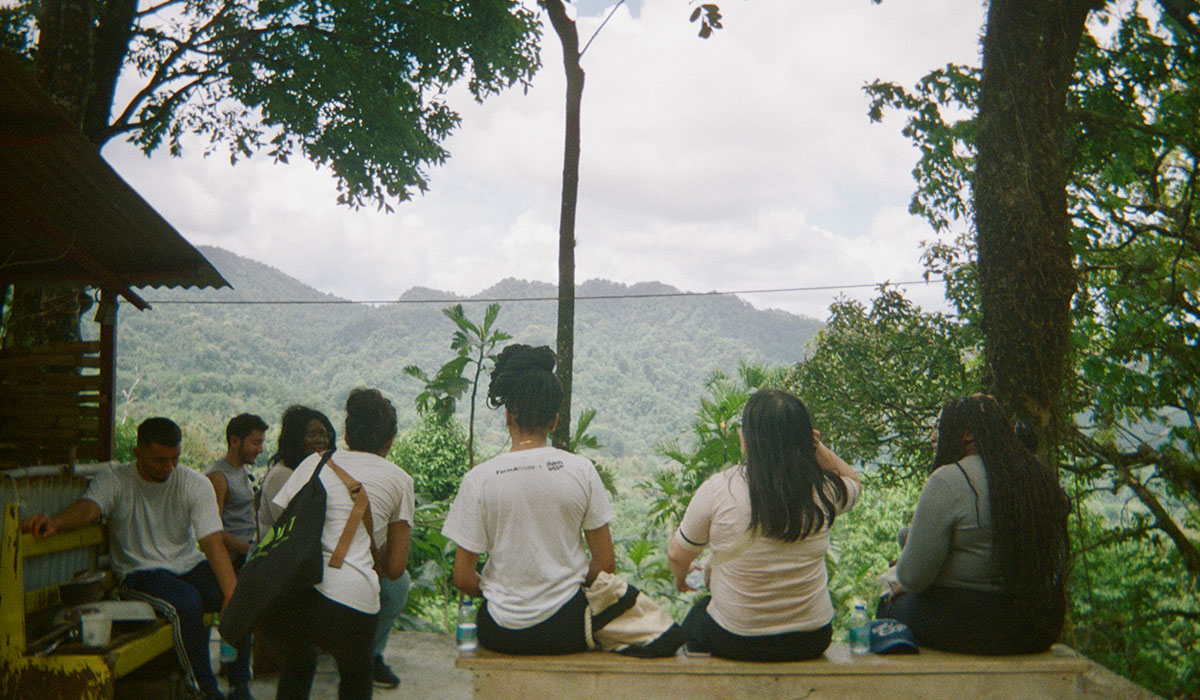
Students overlooking a mountain in Panama through the Global Justice and Change Program (2023).
The Global Justice and Change Program enables students to participate in courses where they can explore topics on a global scale using an equity and justice-oriented lens and African-centred and diverse knowledge systems and perspectives. The program was piloted in 2023 and welcomed 39 students in the first cohort.
The series included courses such as:
- Repositioning Women in Caribbean Agriculture: Food Sustainability and Food Sovereignty in Trinidad and Tobago (INT912), taught by Petra Roberts, where students were invited to learn about global food sustainability, food security, and local producers in the region. Students enrolled in this course spent ten days in Trinidad and Tobago, visiting markets and agricultural projects to learn about sustainability and food security in the region.
- Films for Change: Film Festivals and Activism in Hispanic Culture (SPS512) taught by Enriqueta Zafra, where students travel to Panama to learn about the interconnections between film and film festivals and culture and advocacy.
- Literatures of the Caribbean (ENG620), taught by Hyacinth Simpson, where students engaged with literary texts, films, and musical forms to understand how migration and mass movements have affected English-speaking Caribbean people's identities and experiences in the Caribbean and its diasporas. Students in this course engaged virtually and in person with educational and cultural institutions and organizations in the Caribbean, Canada and the U.K.
- African Studies and Beyond (LIR204) taught by Ndeye Ba, where students are invited to explore African epistemologies and gain an up-close understanding of the rich history, culture and contributions of the continent and its diaspora to knowledge production through an experiential learning trip to Senegal where students can learn directly from local communities. This course is offered for the Spring 2024 term.
- Haudenosaunee Leaders and Writers (with Māori component) (HAU400) taught by Brandon Tehanyatarí:ya'ks Martin, which teaches about two Indigenous cultures: domestic (Haudenosaunee) and international (Māori). Students are invited on an experiential learning trip to the homeland of the international Indigenous culture, the Māori in New Zealand.
All courses, including travel, are fully funded, and applications are open to Canadian citizens and permanent residents who self-identify as Indigenous, Black or racialized, students with disabilities and students experiencing financial barriers. TMU Global leads the program, funded by the Government of Canada's Outbound Student Mobility Pilot Program, in collaboration with the Faculty of Arts and the Faculty of Community Services.
Student Affairs hosted a webinar designed to equip staff to better support Black students’ flourishing at TMU. As part of the session, a panel of students shared their intersectional experiences at the university and staff were encouraged to reflect on their roles in supporting Black students on campus. The webinar was open to all Student Affairs staff and mandatory for all directors and associate directors in the department. It represents one of several EDI training opportunities provided by Student Affairs.
A training program focused on building allyship and providing bystander training brought together 30 to 35 graduate students in the Faculty of Science in 2022. The workshop, supported by the Dimensions program (see Faculty recommendations for more information on the Dimensions pilot), equipped graduate students to better identify and deliberately address instances of anti-Black racism and bias. Plans are underway to expand this training and make it an annual session for all graduate students, including incoming graduate students and their faculty supervisors.
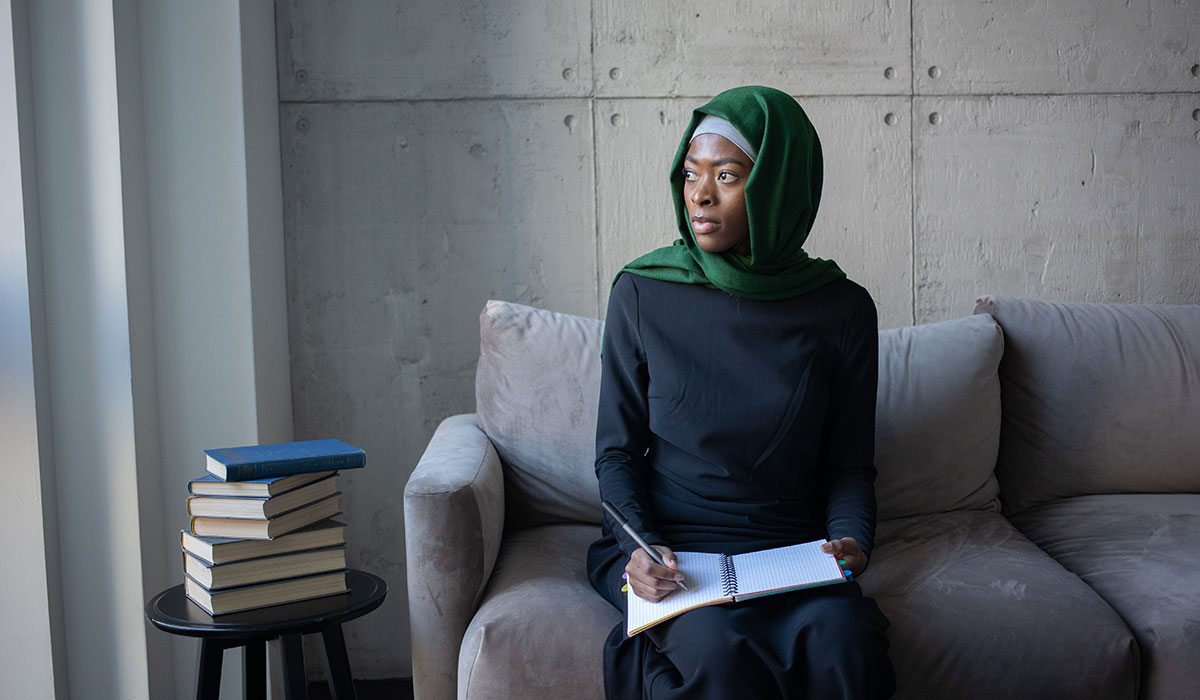
OVPECI’s Human Rights Services administers the university’s confidential complaint resolution process under the Discrimination and Harassment Prevention Policy. The office receives complaints related to anti-Black racism from students, faculty and staff. It works to resolve such matters in ways that address individual incidents of anti-Black racism as well as concerns regarding systemic anti-Black racism within TMU’s learning and working environments. The university’s complaint resolution processes may include investigations or alternative resolutions of complaints, and the office also incorporates restorative justice principles and approaches in its work.
In April 2022, Human Rights Services hired a Senior Resolution Officer and Investigator with specialized expertise in anti-Black racism to lead efforts to enhance the office’s alternative dispute resolution and restorative justice offerings, including through an anti-Black racism lens. This position was made permanent by the university in 2023.
Black on Campus was an orientation week series provided by the Tri-Mentoring Program, Student Life and Learning Support to build relevant community programming for Black students at the start of the fall semester. The series focused on wellness, finances, community building, and connections for Black students.
The Office of the Registrar launched a student recruitment initiative dedicated to collaborating with internal stakeholders and conducting community outreach to engage students facing barriers to accessing university education. As part of this initiative, the office partnered with Pathways to Education in Toronto and has hosted ten events since 2020 to highlight resources and support equity-deserving communities in exploring higher education options. The department also hosted a virtual open house for prospective students from equity-deserving groups; offering sessions focused on Black student experiences, TMU Student Union’s equity service centres and Race Forward.
As part of a highly detailed plan to identify and prioritize relationship building with equity-deserving groups, Athletics and Recreation established meaningful program partnerships with Black student groups. From a basketball tournament and team social to aerobics, spin, yoga and dance classes, the department organized several key events in partnership with and supporting Black and international students and student groups between 2022 and 2023. These events were organized with partners such as the Black Business Student Association, TMU ENACTUS, the Black Law Students Association, the Black Business Graduate Student Association, the BIPOC Student Collective, the TMU African Student Association and the International Student Association.
TMU’s Career, Co-op and Student Success Centre established partnerships with external organizations such as Scotiabank, Accelerate Her Future and Onyx Initiative to deliver and promote career development and mentorship programs for Black students on campus.
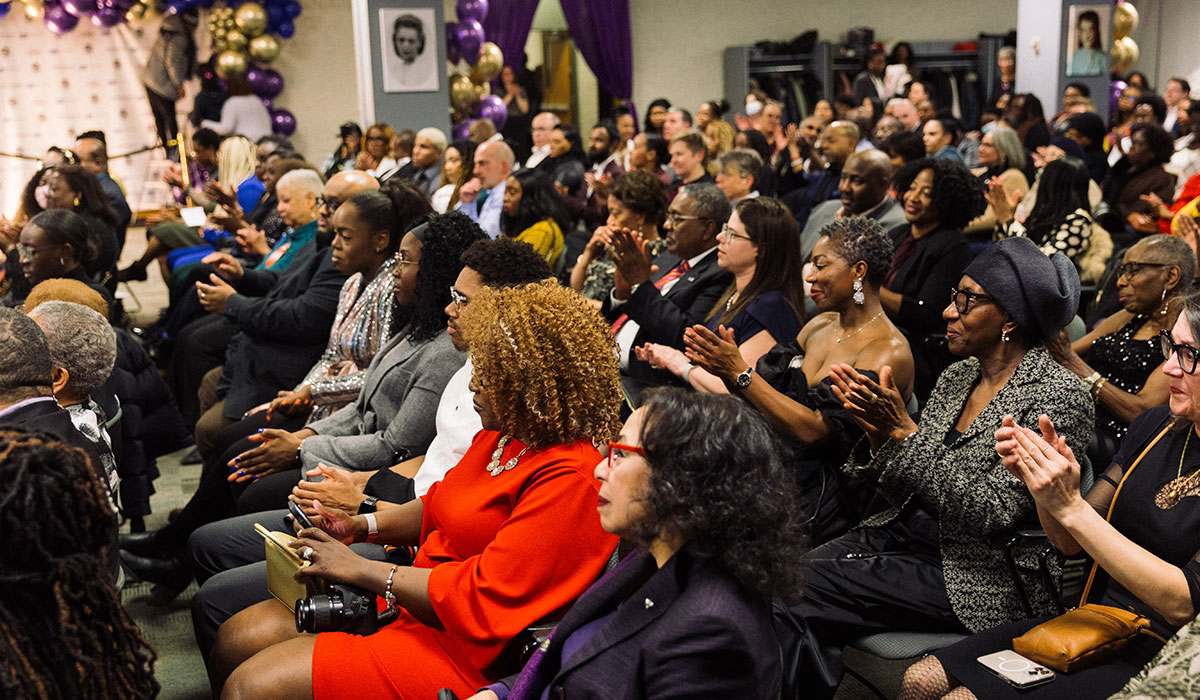
Attendees at the 15th annual Viola Desmond Awards (2023).
New Black community-centred events build upon long-standing high-profile initiatives led by the OVPECI, such as the Viola Desmond Awards and Bursary Program, which recognizes the self-determination, resistance, leadership, joy and legacies of Black women across generations. 2023 marked the 15th anniversary since the Viola Desmond Awards first began celebrating Black women who make a powerful difference in their communities as students, faculty, staff and alumni.
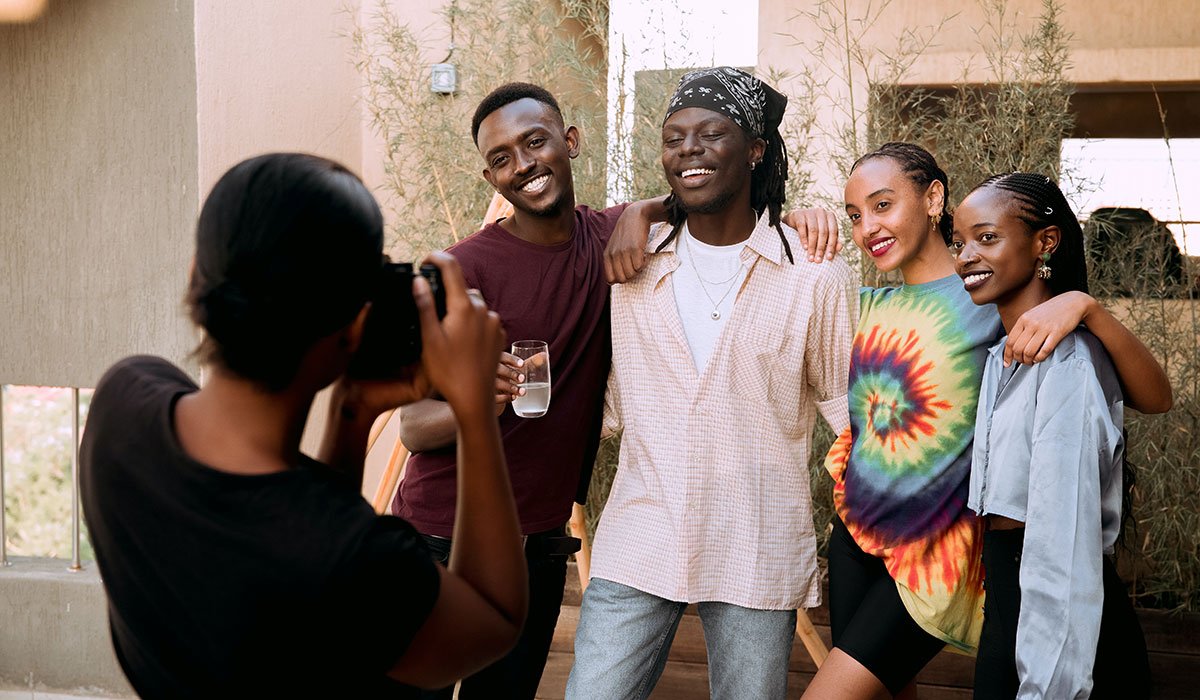
International Student Enrolment, Education and Inclusion hosts an annual meetup for incoming Black international students. Recognizing the unique challenges faced by students who identify as both Black and new to the country, this intersectional event seeks to foster a sense of belonging by creating opportunities for students to better understand the student experience at TMU, meet peers with shared experiences and celebrate their university admission.
On June 23, 2022, Human Rights Services and the Lincoln Alexander School of Law partnered with the Ontario Human Rights Commission to host a conference to mark the 60th anniversary of the Ontario Human Rights Code. The conference included dedicated sessions on anti-Black racism and race-based discrimination, including a presentation from the City of Toronto’s Confronting Anti-Black Racism Unit.
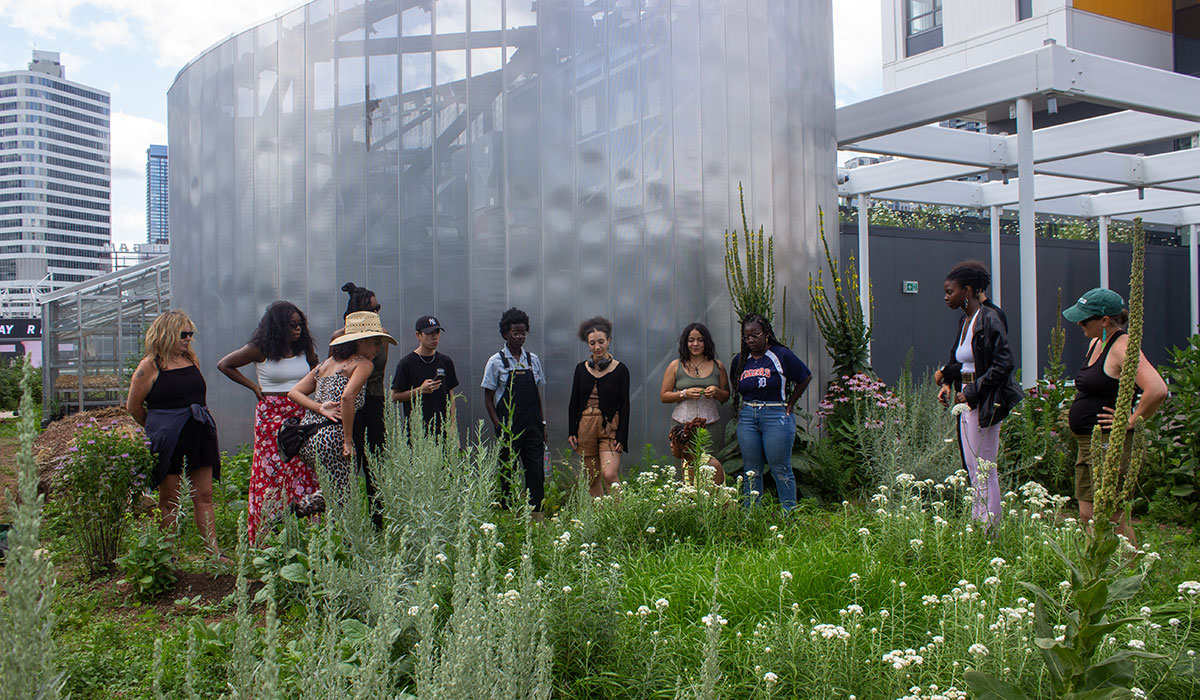
Black students, faculty, staff and community at the Black Sovereignty Initiative at TMU’s Urban Farm (2022).
TMU’s Urban Farm welcomes Black students, faculty, staff and community to join dynamic and engaging programming through ecological rooftop farming and food justice initiatives. In 2022, the farm launched the Harvest Collective and Learning Circle, a Black Food Sovereignty initiative at the Daphne Cockwell Complex rooftop, which aims to engage the community through the multifaceted lens of growing and enjoying food. Participants are invited to explore and learn about topics grounded by the program's four pillars: food literacy, food and social justice, environmental stewardship and community healing. In addition, participants in the Learning Circle can harvest and enjoy the culturally significant crops across the African diaspora.
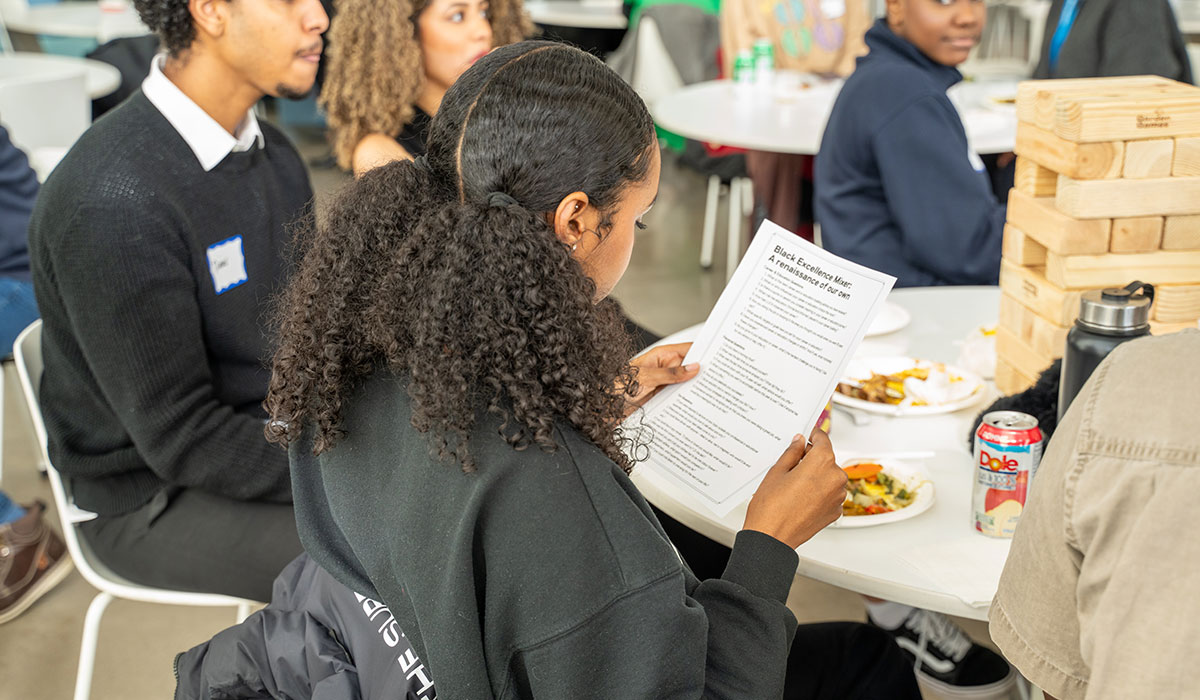
Student at the Black Excellence Mixer reading the intergenerational dialogue guide (2024).
Working from an anti-oppressive framework, the Tri-Mentoring Program, Student Life and Learning Support offer Black student group mentoring to support Black students in finding a sense of belonging while empowering them to discover what they need to be successful in their post-secondary journey.
The Centre for Student Development and Counselling has been building out specific pathways of support for Black students, including:
- hiring more Black counsellors
- creating a system to match students who request to work with a counsellor from a shared background
- developing expedited pathways of care
- providing group therapy to enable healing from race-based and intergenerational trauma
- creating focus groups to understand student needs better
- building connections with the Black student peer-support group
In connection with this initiative and partnership with Student Integrated Health and Wellbeing, Athletics and Recreation has embedded a new Black-identified counsellor to provide culturally competent support to TMU’s student-athlete community.
TMU has a vibrant campus community comprising over 200 student clubs and organizations. While some engage students around shared interests and programs of study, others bring students from equity-deserving groups together around shared lived experiences. There are several Black, African and Caribbean student-led clubs at the university, including, but not limited to, the Black Nursing Student Association, Black Fashion Students Organization, Black Business Graduate Students Association, Caribbean Students’ Association, National Society of Black Engineers and CloudFlo and the African Student Association.
The Ted Rogers Black Business Association is one of the most prominent and active Black-focused student groups within TMU. The group seeks to provide Black students with critical tools to become future change-makers. Notable initiatives organized by the group include:
- Working Without Worries: an event held in collaboration with the TRSM Women in Technology Management and Ted Rogers Pride Alliance to critically interrogate sexual harassment in the workplace from an intersectional lens.
- 30 Under 30: an event which invited professionals across diversities, half of whom identified as Black, to meet and network with students.
- Masterclass of Success: a professional development initiative hosted in collaboration with the Ted Rogers Sales Club and the Human Resources Student Association.
Several Black student advisory groups have also been established to help ensure that Black student voices inform decision making at the university. The Black Student Advisory Committee is a group of students led by the Black Student Support Facilitator in the Tri-Mentoring Program, acting to provide and support an exceptional student experience for Black students. This year, students in the Black Student Advisory Committee are organizing TMU's inaugural Black Flourishing conference for staff, students and faculty. The conference will feature performing artists, keynote speeches and student-led sessions on issues such as student leadership, personal branding and relationship building.
In addition to the groundbreaking Postdoctoral Fellowships for Black Scholars program launched through the PICCABR and the Office of the Provost, several awards and bursaries have been established across the university to support Black students at undergraduate and graduate levels.
Awards include but are not limited to:
- The Black and/or Indigenous Heritage Varsity Student-Athlete Award: The TMU Black and/or Indigenous Heritage Varsity Student Athlete Award was established in 2021 by the Athletics and Recreation department in concert with Ontario University Athletics and its 20 member institutions to provide enhanced financial support to members of Black and Indigenous communities. This athletic financial award is exempt from the general ceiling for athletes in Ontario and is permitted to compound with existing financial awards athletes may receive.
- The BlackNorth Initiative Scholarships: The BlackNorth Initiative established a renewable entrance scholarship in 2021 for Black students entering their first year at the Lincoln Alexander School of Law's JD program in the class of 2024.
- The BLSA Black Excellence Award: The inaugural Black Law Students’ Association (BLSA) class of 2023 established the Black Excellence Award for Black students entering their first year of the Lincoln Alexander School of Law's JD program.
- The Canadian Association of Black Lawyers Award: The Canadian Association of Black Lawyers established an award in 2021 for Black students entering their first year of the Lincoln Alexander School of Law's JD program.
- Canada-wide IBET Momentum Fellowship: The Faculty of Engineering and Architectural Science launched the Canada-wide IBET Momentum Fellowship, offering two full-time Black and Indigenous PhD students up to $30,000 annually over four academic years. The fellowship aims to change the engineering landscape in Canada by reducing barriers for Indigenous and Black students and creating a pipeline of future changemakers in industry and education.
- The Enbridge Award for Black Students: Enbridge established an award in 2022 for upper-year Black students in the Lincoln Alexander School of Law's JD program.
- Faculty of Community Services Black Student Awards: The Faculty of Community Services established the Black Student Awards to support the academic journeys of Black undergraduate and graduate students across the Faculty.
- The TRSM Anti-Black Awareness Committee Bursary: In the 2021-2022 academic year, The Ted Rogers School of Management (TRSM) Anti-Black Racism Awareness Committee awarded a bursary to three first-year Black students.
- The Ted Rogers MBA Black Graduate Leadership Awards: The Ted Rogers MBA Black Graduate Leadership Awards supports three Black graduate students pursuing their studies at the Ted Rogers School.
- Yeates School of Graduate and Postdoctoral Studies (YSGPS) Black Graduate Student Awards: The YSGPS established a series of awards to recognize excellence and/or alleviate some of the financial burden associated with graduate education. The awards include the Black Graduate Student Fellowship, the Black Graduate Student Scholarship and the Black Graduate Student Bursary. The 2023 YSGPS Black Graduate Student Awards were adjudicated by the Dimensions YSGPS lead, Black faculty members and the Associate Dean, Student Affairs, YSGPS. In addition, the first cohort of the new Postdoctoral Fellowship for Black Scholars (administered by YSGPS and funded by the PICCABR and the Office of the Provost) joined TMU in the fall of 2023.
Previous section:
Summary of progress on implementing recommendations
Next section:
Staff recommendations